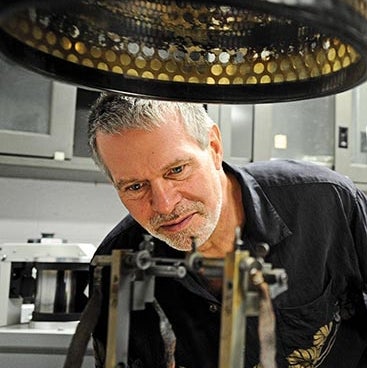KINGSTON, R.I.- September 22, 2017- Earth scientist, mineralogist, and astrobiologist Robert Hazen will deliver a lecture titled “Genesis: The Scientific Quest for Life’s Origins” on Oct. 3 at 7 p.m. at Edwards Hall, 64 Upper College Road, as part of this year’s Honors Colloquium at the University of Rhode Island.
Hazen, a research scientist at the Carnegie Institution of Washington’s Geophysical Laboratory and Clarence Robinson Professor of Earth Science at George Mason University, researches what role minerals play in terms of life’s origins.
Titled, “Origins: Life, the Universe and Everything,” this fall’s colloquium addresses such questions as “Where did we come from? How did the universe begin? How did intelligent, rational beings arise? And from such humble beginnings, how did we develop a mind that can ask these big questions? Now in its 54th year, the colloquium is the University’s premier public lecture series, offers lectures on most Tuesday evenings through Dec. 5. Hazen’s lecture will be shown on the web at stream.uri.edu
The primary focus of Hazen’s research involves different aspects of the coevolving geosphere and biosphere, especially as it pertains to Earth’s ever changing mineralogy. Beyond that, he looks at the close relationship between crystal structure and physical properties. Through the development of different high-pressure and high-temperature techniques, paired with the study of a wide variety of materials, Hazen and his team have been able to isolate and identify new superconductor structure types.
URI Associate Professor of Geosciences in the College of Environment and Life Sciences, Dawn Cardace is looking forward to Hazen’s lecture. “I am keenly interested in the relationship between Earth’s geology and biology, through Earth’s 4.6-billion-year-long history as a planet and across its diverse planetary surface and near subsurface,” Cardace said.
“Everywhere we look, in caves, in sediments and rocks deep beneath the seafloor, in acidic, hotter-than-boiling springs, in ultrabasic groundwaters (pH of 12 and higher–as caustic as ammonia!), in bone dry, salt-encrusted basins, in high-elevation, irradiated plateaus–we find resilient, successful microbial life. How do Earth environments impact the evolution of our enormous microbial biosphere? How do modern microbes living at environmental extremes provide windows into the ways life on the early Earth evolved, or indeed, began? How do Earth’s minerals record evidence of Earth’s ancient biosphere, of its metabolic machinery? Attending Dr. Hazen’s talk will help us gain traction on these enormous, thought-provoking questions.”
Olivia Ross, an intern in the Marketing and Communications Department at URI and public relations major, wrote this press release.
Sponsors: Honors Program • URI Office of the President • URI Office of the Provost • 125th Anniversary Steering Committee • URI Foundation • The Mark and Donna Ross Honors Colloquium Humanities Endowment • The Thomas Silvia and Shannon Chandley Honors Colloquium Endowment • URI College of Arts & Sciences • URI College of Pharmacy • URI John Hazen White Sr. Center for Ethics and Public Service • URI Gender and Women’s Studies Program • URI Office of Community, Equity and Diversity • URI College of Engineering • URI College of the Environment and Life Sciences • URI College of Health Sciences • URI College of Business Administration • URI College of Nursing • URI Division of Student Affairs • URI Department of Communications and Marketing • URI Department of Publications and Creative Services • URI ITS Instructional Technology and Media Services • URI Feinstein College of Education and Professional Studies • George and Anne Ryan Institute for Neuroscience.

